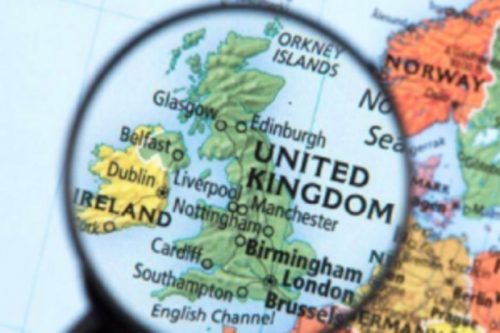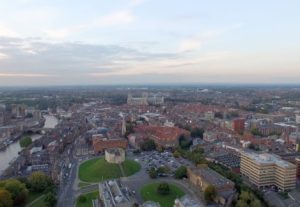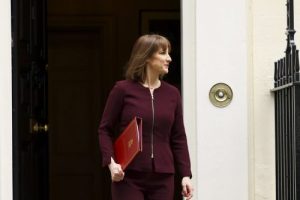Further details of investment zones and no-Mayor devolution deals revealed

Boris Johnson and his naked appeal to the Red Wall and left behind towns may be gone, but the government is ploughing on with devolving regional power and backing regionally focused schemes.
Hunt’s speech touched on the confirmation of the next set of investment zones in Greater Manchester, the West Midlands, and the East Midlands; and a doubling the flexible funding envelope for each investment zone from £80 million to £160 million by extending the programme and associated tax reliefs from five to ten years.
But though he didn’t mention them in his speech, there were also three new devolution deals, which mean that 9 out of 10 people in the North now live in an area with a devolved powers to a combined authority of some description.
To back to the Investment Zones and Freeports he said the government is also creating a new £150 million Investment Opportunity Fund, which will be available over five years.
Announcing three new investment zones, he said the one in Greater Manchester Investment Zone will focus on advanced manufacturing and materials and local partners expect it to help to leverage £1.1 billion in private investment and help to create 32,000 jobs in the region over the next 10 years. The West Midlands Investment Zone will focus on advanced manufacturing and local partners expect it to help to leverage £2 billion in private investment and help to create 30,000 jobs in the region over the next 10 years.
The East Midlands Investment Zone, with a focus on green industries and advanced manufacturing, is expected by local partners to help to leverage £383 million in private investment and help to create 4,200 jobs in the region over the next 10 years.
Two further Investment Zones in Wales; one located across the Cardiff and Newport area, and delivered by the South East Wales Corporate Joint Committee, and another focusing on the Wrexham and Flintshire region delivered by the North Wales Corporate Joint Committee.
As revealed in the Spring Budget the the deeper devolution deals in the West Midlands and Greater Manchester Combined Authorities are edging towards a single pot deal.
A trailblazer devolution deal with the North East is on track to be agreed in spring 2024.
Level 3 deals have been agreed with Greater Lincolnshire, and Hull and East Yorkshire, and Level 2, non-mayoral, deals with Cornwall and Lancashire.
Cllr Mike Ross, Hull City Council Leader, said: “I have always said that I would only want to proceed with a devolution deal for Hull and the East Riding if we felt it was going to be the best deal for the area.
“The region has been left behind when it comes to a whole range of government investment, which puts us at a real disadvantage to both the rest of Yorkshire and the country in general.”
Hull and East Yorkshire’s Business Engagement Board – an advisory partner to the Hull and East Yorkshire Local Enterprise Partnership, which has been campaigning for the deal for years and fully supports the proposal.

“Establishing a Mayoral Combined Authority will unlock significant economic opportunities for our region. We’ll gain access to more funding and investment through greater decision-making powers at a local level. This means more high-quality jobs, more training opportunities for our workforce and more infrastructure investment – to name just a few of the benefits.
“We’ve seen it can work, with the likes of Greater Manchester’s Andy Burnham and the West Midlands’ Andy Street using their status as Elected Mayors to negotiate even more opportunities for their regions, following their devolution deals.
“For a long time, our region has lost out on such opportunities. But this proposed deal will change that. I truly believe it has the potential to change the future of our region.
“I’d like to urge business leaders and local people across Hull and East Yorkshire to get behind this deal and show their support by engaging with the public consultation – which is due to start in January 2024.”
Lancashire County Council revealed that their proposed deal will transfer new money and powers from central government to a newly created Combined County Authority.
and would give local leaders extra powers to tackle key priorities such as better public transport, boosting economic prosperity and improving employment and skills.
The new Combined County Authority would not require a change to the established county, borough or district councils across the area, and there would be no requirement for an elected mayor, nor the power to precept over and above the normal Council Tax ask.
Levelling Up Minister Jacob Young MP said: “I am delighted to agree this Level 2 devolution deal with Lancashire, which will bring more funding and powers out of Whitehall into the hands of communities in Lancashire.

Cllr Phillippa Williamson
Councillor Phillippa Williamson, Leader of Lancashire County Council, said: “This proposed deal would help us to drive regeneration in our town and city centres, support new jobs in growing industries such as low carbon technologies, cyber security and energy, and make sure we have the right skills to take advantage of these opportunities.
“It would also enable greater co-ordination of our collective expertise, priorities and investment in our transport infrastructure to ensure that it meets the needs of people across the region.”
Similarly, North East Lincolnshire Council Leader, Cllr Philip Jackson, said: “Together, we share a united vision to help create the very best opportunities for our respective council areas, and for Greater Lincolnshire as a whole. There is no doubt that this proposed devolution deal is set to provide that.
So far there have been nine mayoral devolution deals across, but the new deals signal a new ‘level three’ devolution deal that was outlined in the 2022 levelling up white paper.
The new devolution deals mean that 9 in 10 people in the North of England are now living in areas covered by a devolution deal.
Lord Jim O’Neill, Chair of the Northern Powerhouse Partnership: “Nearly a decade on from the first devolution deal with Greater Manchester, it is promising to see three more Northern areas stepping forward to play a bigger role in shaping their economic destiny.
“If we are serious about closing the North-South divide, we need empowered local leaders with the knowledge, vision and capacity to tie disparate strands of policy together in a cohesive effort to raise productivity.
“Devolution can have a genuinely transformative effect on local economies, whether by improving transport links, or bringing in investment from around the world.
“Congratulations to everyone involved in what I am sure were painstaking but vital negotiations to get these deals over the line.”
Robert White, chief executive of law firm Brabners, which released a report, True North this year, said: “Businesses will undoubtedly welcome the Chancellor’s move towards prioritising growth. However, if we are to unlock the true potential of the regions, and particularly the North, we require a consistent investment-led approach that transcends short-term political cycles.
“We welcome the extension of the Investment Zones programme – which has doubled the length of the government’s funding commitment to cities like Liverpool, Manchester and Leeds to 10 years – and initiatives like the £4.5 billion investment to boost UK manufacturing in strategic sectors announced last week, which represents an opportunity to generate sustainable sector-led growth and to attract even more transformational inward investment.
“With further de-centralisation anticipated through the government’s trailblazer deals, it is important that purpose-led businesses continue to play their part in delivering positive change – strengthening the North’s proposition on skills, sustainability, innovation and society – in the quest to boost productivity and ultimately deliver inclusive growth and prosperity for the region.”








